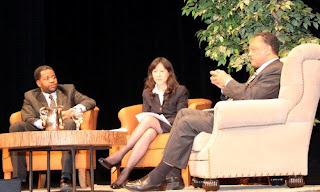Editor's Note: The following is an open letter to Rev. Dr. Frederick D. Haynes, III, senior pastor of the Friendship-West Baptist Church by Rev. Dr. Robert Griffin, a member of the Episcopal Divinity School's Board of Trustees. Rev. Dr. Haynes recently delivered a sermon on President Obama's recent remarks in support of same-sex marriage. You can learn more about the sermon and see excerpts here.
June 13, 2012
Open Letter of Gratitude to
Rev. Dr. Frederick D. Haynes, III
Senior Pastor, Friendship-West Baptist Church
Dear Dr. Haynes:
I want to offer a note of gratitude for your willingness to step up and out by honoring and showing respect not only for President Obama in a recent sermon you gave, but also for affirming the dignity of all human-beings, specifically the marginalized and "outcast," and even more specifically same-gender loving people.
Just as President Obama has used the highest office of our country to call for inclusion of all in our democracy, you have used the highest platform of the church, specifically that of the Black church, the pulpit, to give voice to what too often remains unspoken. Thank you for using your position and the pulpit in a manner that reminded me of our roots in finding in spirituality a call to do justice and an obligation to challenge the system and status quo at all levels. I trust that your witness to the gospel as you understand, and apparently live into it, will be an example for others to add their voices to a call to do right by all and for all. Your affirmation of the sacred value of lesbian and gay persons is courageous, righteous, and inspiring. And I, for one, want to thank you.
As an out gay minister with the Metropolitan Community Churches on staff at the Sunshine Cathedral in Fort Lauderdale, FL and former Baptist, your words touched a part of my spirit that reminded me of what the Baptist church was and can still be - a courageous, autonomous, prophetic voice crying out and answering the call "To act justly and to love mercy and to walk humbly with your God." Micah 6.8
Please know that I believe that the mustard seeds of your words will and have already had an impact not just on you and your local congregation but also on our nation. Your voice was needed for such a time as this!
Thank you and may God continue to bless you, your family and your ministry.
Rev. Dr. Frederick D. Haynes, III
Senior Pastor, Friendship-West Baptist Church
Dear Dr. Haynes:
I want to offer a note of gratitude for your willingness to step up and out by honoring and showing respect not only for President Obama in a recent sermon you gave, but also for affirming the dignity of all human-beings, specifically the marginalized and "outcast," and even more specifically same-gender loving people.
Just as President Obama has used the highest office of our country to call for inclusion of all in our democracy, you have used the highest platform of the church, specifically that of the Black church, the pulpit, to give voice to what too often remains unspoken. Thank you for using your position and the pulpit in a manner that reminded me of our roots in finding in spirituality a call to do justice and an obligation to challenge the system and status quo at all levels. I trust that your witness to the gospel as you understand, and apparently live into it, will be an example for others to add their voices to a call to do right by all and for all. Your affirmation of the sacred value of lesbian and gay persons is courageous, righteous, and inspiring. And I, for one, want to thank you.
As an out gay minister with the Metropolitan Community Churches on staff at the Sunshine Cathedral in Fort Lauderdale, FL and former Baptist, your words touched a part of my spirit that reminded me of what the Baptist church was and can still be - a courageous, autonomous, prophetic voice crying out and answering the call "To act justly and to love mercy and to walk humbly with your God." Micah 6.8
Please know that I believe that the mustard seeds of your words will and have already had an impact not just on you and your local congregation but also on our nation. Your voice was needed for such a time as this!
Thank you and may God continue to bless you, your family and your ministry.
Sincerely,
Rev. Dr. Robert Griffin



